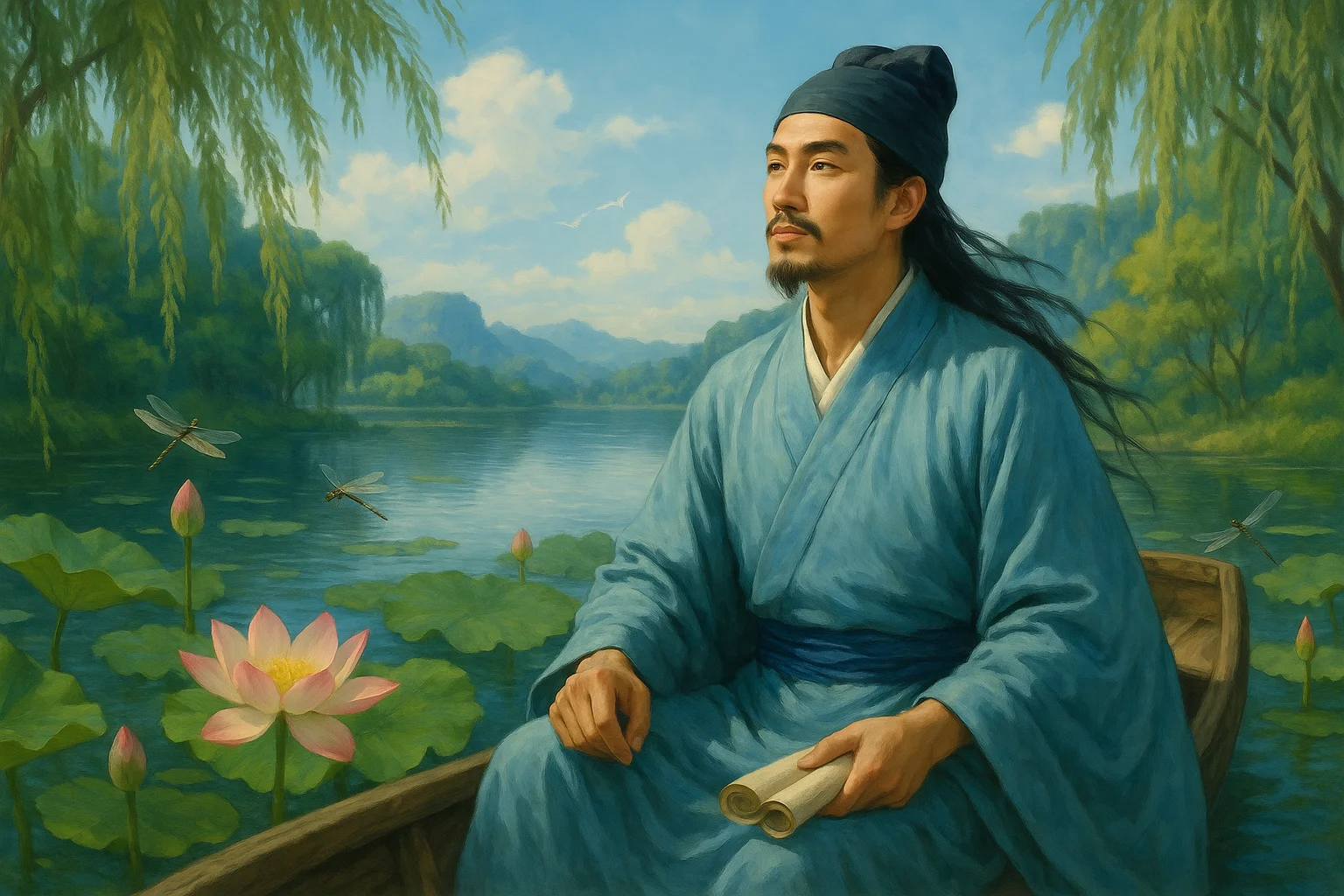The stream flows bridge-bound, never turning back,
A boat still drifts—pushed by a short pole's track.
If friendship were like this mountain ferry,
It would sail through gales or waves—never weary.
Original Poem
「三江小渡」
杨万里
溪水将桥不复回,小舟犹倚短篙开。
交情得似山溪渡,不管风波去又来。
Interpretation
Composed between the second year of the Longxing era and the second year of the Qiandao era (1164–1166) of the Southern Song Dynasty. At this time, Yang Wanli had resigned from office due to his father’s illness and returned to Jishui. Shortly after, his father passed away, and he observed a three-year mourning period in accordance with ritual customs, finding himself in a low point of life. His official career, just begun, faced severe setbacks, casting shadows over his future; compounded by the pain of losing his father, his state of mind was inevitably sorrowful. Against this backdrop, Yang composed this poem in his hometown, blending parting sorrow with steadfast devotion to enduring friendship.
First Couplet: "溪水将桥不复回,小舟犹倚短篙开。"
Xī shuǐ jiāng qiáo bù fù huí, xiǎo zhōu yóu yǐ duǎn gāo kāi.
The stream flows past the bridge, never to return;
A small boat still pushes off, relying on its short pole.
This couplet uses imagery of the stream and boat to depict the setting of farewell. The relentless, irreversible flow of water subtly mirrors life’s unpredictability and the inevitability of parting. The boat advancing with its pole sketches the friend’s imminent journey, evoking a gentle sense of reluctant separation.
Second Couplet: "交情得似山溪渡,不管风波去又来。"
Jiāoqíng dé shì shān xī dù, bùguǎn fēngbō qù yòu lái.
May our bond resemble this mountain stream ferry crossing—
Unyielding to storms that come and go.
Transitioning from scene to emotion, the poet speaks directly from the heart. Using the "mountain stream ferry crossing" (山溪渡 shān xī dù) as a metaphor for steadfast friendship, he suggests that even amid turmoil, true connection persists, symbolizing how genuine camaraderie withstands life’s upheavals. This expresses both hope for his friend and the poet’s own ideal of enduring fellowship.
Holistic Appreciation
This work excels in concise scenery and sincere emotion. The first two lines borrow nature to convey parting, using the stream and boat to accentuate farewell sentiments; the latter lines shift to reflection, employing the "mountain stream ferry" as a metaphor to express unwavering friendship. In just over twenty characters, it fuses scene, feeling, and philosophy, capturing both the poignancy of separation and the constancy of true bonds. Amid career setbacks and personal grief, Yang Wanli cherished the warmth and support of friendship all the more. Though brief, the poem resonates powerfully, reflecting the poet’s pursuit of authentic human connection despite adversity.
Artistic Merits
- Emotion through scenery, philosophy through objects: The stream and boat transcend mere description, embodying life’s impermanence and blending scene with sentiment.
- Precise metaphorical resonance: The "mountain stream ferry" metaphor for friendship feels organic and profound, showcasing Yang’s gift for transforming everyday sights into poetry.
- Clear structural progression: The opening couplet sets the scene and mood; the second articulates heartfelt emotion—reason and feeling intertwine, culminating with force.
- Concise and unadorned language: Plain yet potent diction carries deep emotion, epitomizing Yang’s signature Chengzhai style.
Insights
This poem reminds us that life’s currents, like the stream, flow irreversibly onward, and storms are inevitable. Yet within such flux, genuine friendship serves as a ferry crossing—offering refuge amid turbulence. Through this humble riverside image, Yang Wanli conveys the enduring warmth of human bonds. Its message remains vital: amid life’s changes, holding fast to true connection is our deepest solace.
About the Poet

Yang Wanli (杨万里 1127 - 1206), a native of Jishui in Jiangxi, was a renowned poet of the Southern Song Dynasty, celebrated as one of the "Four Great Masters of the Restoration" alongside Lu You, Fan Chengda, and You Mao. He attained the jinshi degree in 1154 and rose to the position of Academician of the Baomo Pavilion. Breaking free from the constraints of the Jiangxi School of Poetry, he pioneered the lively and natural "Chengzhai Style," advocating for learning from nature and employing plain yet profound language. His poetry, often drawing inspiration from everyday life, profoundly influenced later schools of lyrical expression, particularly the Xingling (Spirit and Sensibility) School.












